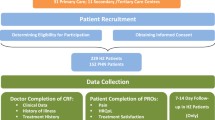Abstract
A new measure of treatment satisfaction (GHerpTSQ) for recurrent genital herpes simplex virus (HSV) was validated and used to evaluate two therapeutic strategies widely used for the management of HSV: episodic treatment, where individual herpes outbreaks are treated as they arise; suppressive therapy, where treatment is taken daily to prevent HSV outbreaks. Satisfaction with treatment is important since daily dosing with suppressive therapy is necessary in the absence of symptoms. A 12-item questionnaire was designed using a modified form of the Diabetes treatment satisfaction questionnaire (DTSQ). The psychometric properties of the GHerpTSQ were evaluated within a sample of 125 Canadians with a history of HSV (type 1, 2) infection participating in a 48 week randomised cross-over trial. Factor analysis suggested that the items can be analysed as two separate subscales corresponding to Control/effectiveness, and Convenience/lifestyle; the single item concerning side effects was retained for separate analysis. Forced one-factor analysis showed that the two subscales can be combined to obtain a total score relating to overall treatment satisfaction. The GHerpTSQ has good internal reliability, clear structure with little overlap of subscales and evidence of good sensitivity to changes in treatment.
Similar content being viewed by others
Abbreviations
- DTSQ:
-
Diabetes treatment satisfaction questionnaire
- DTSQc:
-
Diabetes treatment satisfaction questionnaire change version
- DTSQs:
-
Diabetes treatment satisfaction questionnaire status version
- EESS:
-
Participants randomised to receive episodic therapy for the first 24 study weeks then crossed over to suppressive therapy
- GH:
-
Genital herpes
- GHerpTSQ:
-
Genital herpes treatment satisfaction questionnaire
- GHerpTSQc:
-
Genital herpes treatment satisfaction questionnaire change version
- GHerpTSQs:
-
Genital herpes treatment satisfaction questionnaire status version
- HIVTSQ:
-
HIV treatment satisfaction questionnaire
- RetTSQ:
-
Diabetic retinopathy treatment satisfaction questionnaire
- RGHQoL:
-
Recurrent genital herpes quality of life questionnaire
- SSEE:
-
Participants randomised to receive suppressive therapy for the first 24 study weeks then crossed over to episodic therapy
References
Fitzpatrick R, Hopkins A. Measurement of patients’ satisfaction with their care. Royal College of Physicians of London, 1993.
R Patel S Tyring A Strand MJ Price DM Grant (1999) ArticleTitleImpact of suppressive antiviral therapy on the health related quality of life of patients with recurrent genital herpes infection Sex Transm Infect 75 IssueID6 398–402 Occurrence Handle10754944 Occurrence Handle1:STN:280:DC%2BD3c3hslOntA%3D%3D Occurrence Handle10.1136/sti.75.6.398
M Reitano S Tyring W Lang C Thoming AM Worm S Borelli LO Chambers JM Robinson L Corey (1998) ArticleTitleValacyclovir for the suppression of recurrent genital herpes simplex virus infection: a large-scale dose range-finding study. International Valacyclovir HSV Study Group J Infect Dis 178 IssueID3 603–610 Occurrence Handle9728526 Occurrence Handle1:CAS:528:DyaK1cXlvVyks7Y%3D Occurrence Handle10.1086/515385
C Bradley (1994) Diabetes treatment satisfaction questionnaire (DTSQ) C Bradley (Eds) Handbook of Psychology and Diabetes Harwood Academic Publishers GmbH Chur 111–132
C Bradley (1999) ArticleTitleDiabetes treatment satisfaction questionnaire: change version for use alongside status version provides appropriate solution where ceiling effects occur Diabetes Care 22 IssueID3 530–532 Occurrence Handle10097946 Occurrence Handle1:STN:280:DyaK1M7pvVSiuw%3D%3D
K Howorka J Pumprla C Schlusche D Wagner-Nosiska A Schabmann C Bradley (2000) ArticleTitleDealing with ceiling baseline treatment satisfaction level in patients with diabetes under flexible, functional insulin treatment: Assessment of improvements in treatment satisfaction with a new insulin analogue Qual Life Res 9 915–930 Occurrence Handle11284211 Occurrence Handle1:STN:280:DC%2BD3M3ivVCgtA%3D%3D Occurrence Handle10.1023/A:1008921419108
C Bradley R Plowright J Stewart E Witthaus (2000) ArticleTitleDiabetes treatment satisfaction questionnaire (change) in English and German evaluated in insulin glargine trials Diabetologia 43 IssueID1 A196
A Woodcock C Bradley (2001) ArticleTitleValidation of the HIV treatment satisfaction questionnaire (HIVTSQ) Qual Life Res 10 517–531 Occurrence Handle11789552 Occurrence Handle1:STN:280:DC%2BD38%2FmtlKrsQ%3D%3D Occurrence Handle10.1023/A:1013050904635
SM Barendse C Bradley (2000) ArticleTitleThe RTSQ (renal treatment satisfaction questionnaire): A condition-specific measure of satisfaction with treatment for end-stage renal failure Perit Dial Int 20 IssueIDSuppl. 1 S82
AJ Woodcock C Bradley R Plowright T Kennedy-Martin A Hirsch (2003) ArticleTitlePatient experiences of treatment for diabetic retinopathy: Development of a retinopathy-specific treatment satisfaction questionnaire Diabet Med 19 IssueIDsuppl. 2 10
JI Cohen PA Brunell SE Straus PR Krause (1999) ArticleTitleRecent advances in varicella-zoster virus infection Ann Intern Med 130 IssueID11 922–932 Occurrence Handle10375341 Occurrence Handle1:STN:280:DyaK1M3ps1WjsQ%3D%3D
B Romanowski RB Marina JN Roberts (2003) ArticleTitleValtrex HS230017 Study Group. Patients’ preference of valacyclovir once-daily suppressive therapy versus twice-daily episodic therapy for recurrent genital herpes: A randomized study Sex Transm Dis 30 IssueID3 226–231 Occurrence Handle12616141 Occurrence Handle1:CAS:528:DC%2BD3sXhs1agtrY%3D
Romanowski B, Grant ZA, Taback N. An open design study to determine subject treatment preference of once-daily valacyclovir as suppressive therapy versus valacyclovir twice-daily episodic treatment for recurrent genital herpes infections. Abstract 770. Toronto, Canada: 40th ICAAC Conference, 2000.
JI Cohen PA Brunell SE Straus PR Krause (1999) ArticleTitleRecent advances in varicella-zoster virus infection Ann Intern Med 130 IssueID11 922–932 Occurrence Handle10375341 Occurrence Handle1:STN:280:DyaK1M3ps1WjsQ%3D%3D
D Ormrod K Goa (2000) ArticleTitleValacyclovir: A review of its use in the management of herpes zoster Drugs 59 IssueID6 1317–1340 Occurrence Handle10882165 Occurrence Handle1:CAS:528:DC%2BD3cXltFOgtL8%3D Occurrence Handle10.2165/00003495-200059060-00009
S Senn (2000) Cross-over Trials in Clinical Research John Wiley and Sons Ltd England
Singh H, Plowright R, Bradley C. Linguistic validation of diabetes-specific psychological measures in Hindi and Punjabi. Proceedings of the British Psychological Society 2004 (in press).
Acquadro C, Conway K, Giroudet C, Mear I. Linguistic validation manual for patient-reported outcomes (PRO) instruments. Lyon, France: Mapi Research Institute, 2004.
Author information
Authors and Affiliations
Corresponding author
Rights and permissions
About this article
Cite this article
Taback, N.A., Bradley, C. Validation of the genital herpes treatment satisfaction questionnaire (GHerpTSQ) in status and change versions. Qual Life Res 15, 1043–1052 (2006). https://doi.org/10.1007/s11136-006-0048-2
Accepted:
Issue Date:
DOI: https://doi.org/10.1007/s11136-006-0048-2



